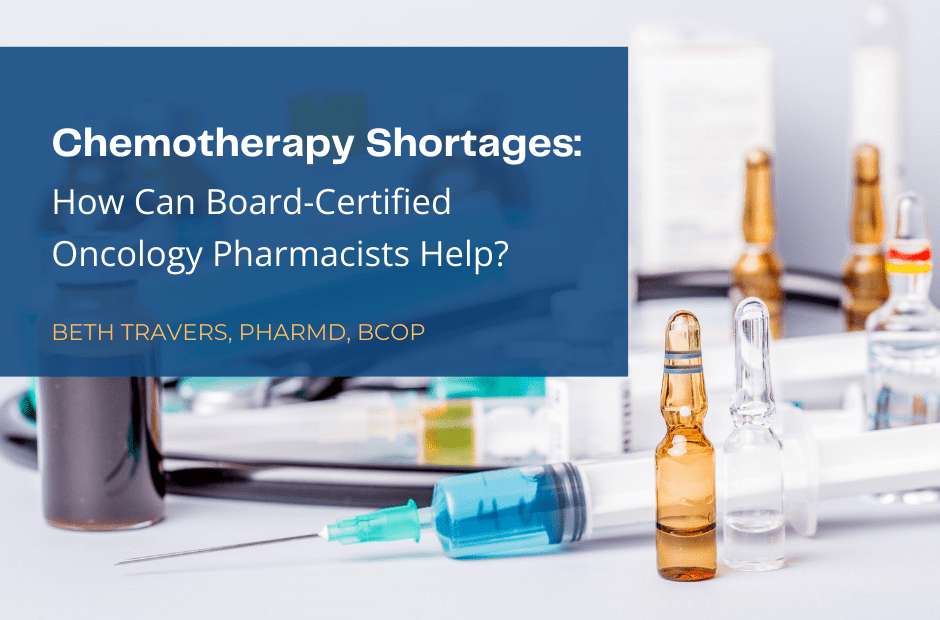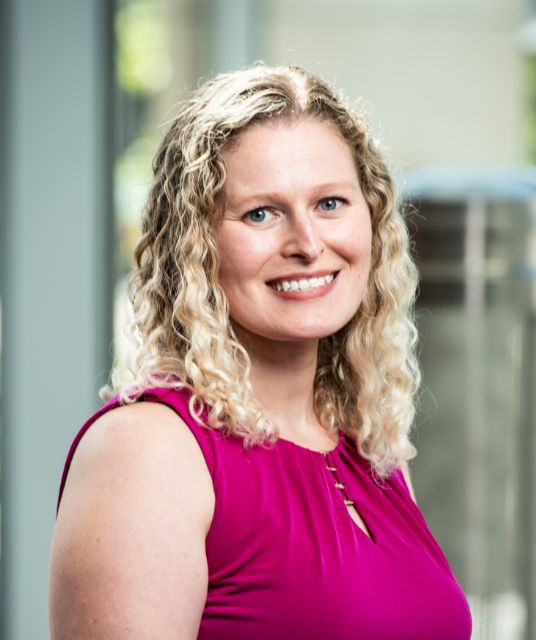Chemotherapy Shortages: How Can Board-Certified Oncology Pharmacists Help?
Whether we like it or not, shortages constantly impact our ability to deliver safe and effective patient care. Over the years, we've seen everything from fluids to medications in short supply. In the United States, we have been facing some degree of chemotherapy shortages for the last 15+ years. Let's look at a simple timeline to gain some perspective.
- 2011: Cytarabine was in shortage, causing hospitals to ration supplies and halt treatment.
- 2012: Paclitaxel shortages forced hospitals to use more costly alternatives.
- 2019: Vincristine shortages impacted pediatric leukemia patients.
- 2023: Carboplatin and cisplatin shortages occurred, preventing hospitals from procuring enough medication to treat their patients.
And it's not just the chemotherapy; we've also seen shortages of our supportive care medications, including filgrastim-sndz, promethazine, and prochlorperazine.
unique challenges in oncology drug shortages

Chemotherapy shortages are different from other medication shortages due to the lack of available therapeutic interchanges and the aggressiveness of many cancer types. In oncology, drug shortages can lead to delays in care, rationing, emotional distress for patients and families, and lead to worse health outcomes.
Here comes the big question; What do we do when patients need treatment and the optimal therapy isn't available? In 2013, a study of oncologists showed they most commonly managed chemotherapy shortages by switching chemotherapy regimens (78%), substituting chemotherapy drugs (76%), or delaying treatment (43%). Unfortunately, limited data is available to guide decision-making in these situations, and pharmacists play a crucial role in assisting with clinical management during a shortage.
In 2023, the Food and Drug Administration (FDA) attempted to mitigate the cisplatin shortage by temporarily approving the use of cisplatin imported from China. However, these products are not FDA-approved, and the quality may not meet FDA regulations. These foreign products also have differences in formulation and compounding that require those preparing or administering these imported medications to be particularly vigilant.
Even with additional medications being imported from other countries, insufficient supply may still exist to meet demand. Potential solutions include: dose-rounding chemotherapy to stay within 10% of the prescribed dose, creating allocation frameworks to help ethically distribute the limited supply of life-saving chemotherapy, and altering chemotherapy plans to remove or switch unavailable chemotherapy agents. A pharmacist's input is invaluable since there is little to no data to support these practices.
how bcop pharmacists can help
A board-certified oncology pharmacist can help oncologists review disease guideline recommendations and evaluate the level of evidence regarding alternative treatment options. We can also help talk through options with patients and ensure they are aware of potential impacts on their treatment due to medication shortages. A board-certified pharmacist can provide additional expertise regarding alternative therapy options, particularly when first-line options are unavailable. Pharmacists are always a valued addition to the healthcare team, but in times of uncertainty (like chemotherapy shortages), we can serve as medication stewards and help promote ethical decision-making while providing evidence-based care.
If you want to become a Board-Certified Oncology Pharmacist (BCOP), check out our newly updated and improved BCOP board exam review. We can also help you with other board certification needs if you would like to elevate your credentials to assist patients in these difficult situations in your specialty. We provide everything you need to succeed in board certification and produce high-yield results for your patients and practice.

Elizabeth Travers, PharmD, BCOP
Associate Editor
Dr. Travers is a Hematology/Oncology clinical pharmacist specializing in malignant hematology, as well as blood and marrow transplant. She graduated from Duquesne University School of Pharmacy. She completed a PGY1 Pharmacy Practice Residency at Ochsner LSU Health and a PGY2 Hematology/Oncology Pharmacy Residency at Nebraska Medicine. She is also a Board-Certified Oncology Pharmacist (BCOP). Dr. Travers currently practices at the University of Kentucky Markey Cancer Center in Lexington, Kentucky. She is actively involved in training APPE students, PGY1 residents, and PGY2 Hematology/Oncology residents. She loves being able to help future pharmacists and oncology specialists understand difficult topics and provide the best possible care to their patients.
References
Santos ES, Oliver TK, Lacchetti C, et al. Drug Shortages in Oncology: ASCO Clinical Guidance for Alternative Treatments. JCO Oncology Practice. 2023;20(1).
N Engl J Med. 2013;369:2463-2464.
HOPA Issues Drug Shortages Brief. Hematology/Oncology Pharmacy Association. January 19, 2022. Accessed 8/1/24. https://www.hoparx.org/latest-news/drug-shortages-issue-brief/.
Sharfstein J. How Drug Shortages Are Affecting Cancer Treatments. Johns Hopkins Bloomberg School of Public Health. July 18, 2023. Accessed 8/1/24. https://publichealth.jhu.edu/2023/drug-shortages-are-affecting-cancer-treatments.
Nelson B, Faquin W. Generic cancer drugs are still in short supply. Cancer Cytopathology. 2024;132(1):5-6.
You may also like:
Blog: BPS Test-Taking Strategies Series: Part I
Blog: BPS Test-Taking Strategies Series: Part II
Blog: How Important are Biostatistics & Clinical Literature on BPS Exams?



